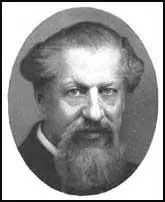Edwin Arnold

Edwin Arnold was born in Gravesend on 10th June, 1832. He went to Oxford University where he won the Newdigate prize for poetry. After university he taught at King Edward's School, Birmingham and Bombay University in India.
Arnold returned to England in 1861 and joined the staff of the Daily Telegraph. On the death of Thornton Leigh Hunt in 1873, Arnold was appointed editor of the newspaper. His views were less liberal than those of Hunt and the paper began to question the policies of the government led by William Gladstone. Arnold was particularly upset by attempts to cut defence expenditure and claimed that Gladstone would "fling half our Empire overboard and jettison India herself in order to teach Britain modesty." Whereas Hunt used to describe Gladstone in the Daily Telegraph as the "People's William", Arnold favoured the more imperialistic policies of his Conservative opponent, Benjamin Disraeli.
Arnold recruited staff that shared his political opinions and worked closely with Ellis Ashmead Bartlett, a strong advocate of British Imperialism in the House of Commons. Under the editorship of Arnold circulation of the newspaper continued to grow. In 1870 the daily average circulation was 196,855 and by 1877 it had risen to 242,215.
Arnold had a deep love of exploration and persuaded the proprietor, Edward Levy-Lawson, to spend large sums of money to obtain dramatic stories. This included joining with Bennett of the New York Herald to finance Stanley's search for David Livingstone in Africa. The Daily Telegraph also largely financed Sir Harry Johnson's exploration of Kilimanjaro in 1884.
A loyal supporter of the Conservative Party, Arnold was granted a knighthood by the Marquess of Salisbury in 1888. Later that year he resigned as editor of the Daily Telegraph and became the paper's travelling commissioner.
Arnold wrote the highly acclaimed, The Light of India: The Great Renunciation (1879). Other titles written by Arnold included India Revisted (1886), Seas and Lands (1891), Wandering Worlds (1894) and East and West (1896).
Edwin Arnold, who suffered from failing eyesight in his later years, died on 24th March, 1904.
Primary Sources
(1) Harry Levy-Lawson, The Story of the Daily Telegraph (1955)
All the traditions of the Daily Telegraph were Liberal. From the beginning it supported Palmerston. For Gladstone it coined the title of "the People's William" and for many years Edward Levy-Lawson saw Gladstone or Montagu Corry, his confidential secretary, almost daily.
Edward Arnold who in Eastern policy was continually and vehemently against Gladstone. The break was gradual. During Disraeli's second administration the Daily Telegraph "crossed the floor" and became a Conservative newspaper.
